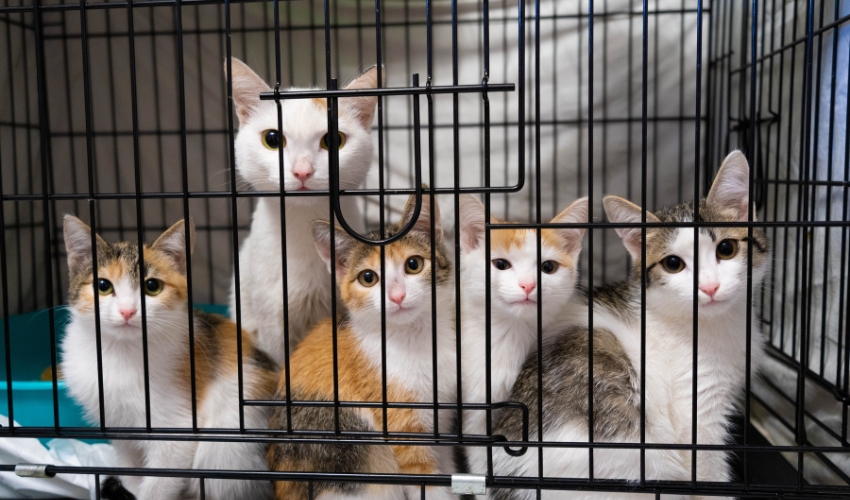
FIV-positive cats have always had a bad rap. They’re either killed in shelters or deemed unadoptable for life when in truth, they’re just as adoptable as non-FIV cats.
In fact, Dr. Annette L. Litster from Purdue University’s College Of Veterinary Medicine conducted a study published in The Veterinary Journal that confirmed what many devoted animal lovers, rescuers, and crusaders strongly believed: FIV-positive cats can’t spread FIV through casual contact, nor can FIV-positive mother cats pass the virus to their kittens. So, can FIV-positive cats live with non-FIV cats? The short answer is: yes, they most definitely can!
How Do Cats Get FIV?
Thanks to Dr. Litster’s study, there’s solid proof that FIV-positive cats can’t spread FIV through casual contact alone. That means normal day-to-day activities such as playing, grooming, and sharing toys, beddings, litter boxes, or food and water bowls won’t get any non-FIV cats infected.

The only way FIV-positive cats can infect non-FIV cats with the virus is through deep bite wounds that actually break the skin. However, if cats are spayed or neutered, and socialized properly, it’s rare for them to get into extremely aggressive fights with others. Therefore, it’s highly unlikely for fixed, friendly household cats—FIV-positive or not—to bite their fellow felines.
Can Kittens Get FIV from an FIV-Positive Mother Cat?
Another common misconception that the study proved wrong is: all kittens born from an FIV-positive mother cat can contract FIV in-utero. It’s devastating to think about the number of kittens getting euthanized simply because they were tested for FIV too early. It’s extremely rare for an FIV-positive cat to pass the virus to her kittens.

If an FIV–positive mother cat gives birth, her kittens may momentarily test positive for FIV because of the presence of maternal antibodies in their system. The test will detect the FIV antibodies—not the actual FIV virus—and come out as false-positive. These antibodies will naturally go away when the kittens are about six to eight months old.
A good time to get a kitten tested for FIV is when they’re at least eight months. Any testing done before they reach that age will not be accurate.
Can Humans Get FIV?
While FIV (Feline immunodeficiency virus) and HIV (Human immunodeficiency virus) belong to the same family (retroviruses) and class (lentivirus) of viruses, there’s no reason to be alarmed. Both FIV and HIV are species-specific, meaning FIV can only infect cats and HIV can only infect humans.

Open Your Home to an FIV-Positive Cat
Caring for an FIV-positive cat really isn’t much different from caring for a non-FIV one. Both cats have just about the same needs: complete vaccinations, regular vet visits/check-ups, exercise, a healthy diet, and spaying or neutering. With the right care, they can live long and happy lives like any other cat.
Tons of FIV-positive cats in shelters are living miserable lives because of misguided rumors about their disease. If not euthanized, they mostly stay in the shelter for the rest of their lives and never get the chance to experience the warmth of a cozy cat bed, the thrill of chasing cat toys, and the love of a real family. So if you can, please open your home to an FIV-positive cat.

Go to the nearest animal shelter in your area and adopt or foster. If not, help us spread the right information about FIV and prevent innocent and perfectly adoptable cats from getting euthanized or being left to rot in shelters.
Sure, some of them can be a bit more vulnerable to diseases because of their weakened immune systems, but that doesn’t mean they can’t lead normal healthy lives with the help of proper nutrition, regular vet visits, and TLC from the right family.
You can check out Cole and Marmalade on YouTube to see exactly how awesome FIV-positive cats can be when given the chance!











